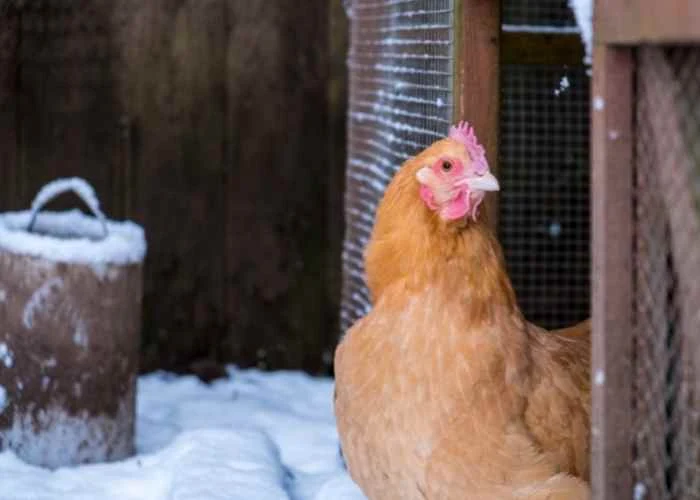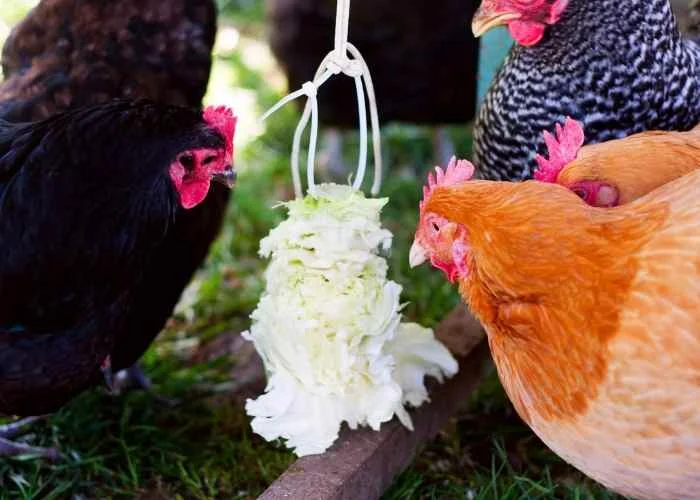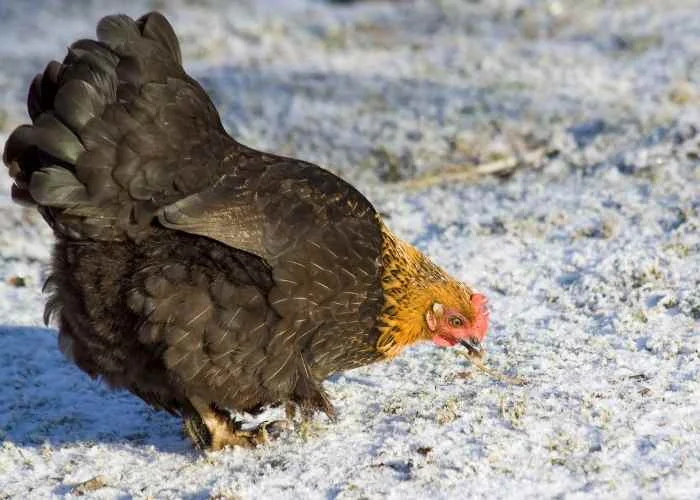Learn how to winterize chicken coops. By spending a few hours preparing your coop, you can keep your flock safe from the cold and prevent having to heat your coop. Learn the best way to winterize chicken coop to keep your birds healthy and warm through the winter.
How to Winterize Chicken Coops
The first year we got our chickens, we wondered how do I winterize my chicken coop? We live in Ohio, so it can get really cold.
The coop was here when we bought the farm, and it hadn't been used in about 15 years. It was a wonderful coop with three rooms and plenty of room for chickens.
Unfortunately, it needed a lot of work. We had to tear it down last year and build a new one. More on that coming in future posts.
Chickens aren't the brightest animals. I had heard to open the coop door in the winter and let the chickens decide if they wanted to go out.
So I opened it and took my kid to an appointment. We came back to chicken statues all over the farm. The chickens went out and got too cold, so they just stood in one spot because they didn't know what to do.
We walked around, gathering up the chickens and putting them back in the coop. Luckily, we didn't lose any that day.
Learn more about backyard chickens in these posts:
- Best Chicken Breeds for Pets and Kids
- How to Keep Your Chickens Warm in Winter
- Best Chicken Toys for Coop
- Best Chicken Breeds for Eggs
What Is The Lowest Temperature Chickens Can Tolerate?
Chickens are most comfortable in temperatures in the seventies (Fahrenheit). That being said, however, your chickens will be able to survive in extremely cold temperatures. Chickens can survive in temperatures as low as the teens.
If the temperature starts to drop down into the single digits or the negatives you should be prepared to keep them warm. This is why it is important to learn how to winterize chicken coops, especially if you live in a climate where temperatures drop very low in the wintertime.
Can Chickens Freeze To Death?
Unfortunately, chickens can freeze to death and have been known to be in extreme cold. The most important factor in what temperatures a chicken can withstand depends on the breed.
Some breeds of chicken are much more tolerant to the cold than others. When you're selecting your chickens, look for cold hardy breeds.
As such, I strongly suggest researching the breed of your chickens you have or want to buy. Make sure to keep them well above lethal temperatures and keep them comfortable.
Thankfully, however, chickens are rather hardy towards the cold so this should not be a major issue for you.
If your chickens are susceptible to cold, I strongly recommend you learn how to winterize a chicken coop before the cold hits, as it will need to be done each year.
Can Chickens Stay In The Coop During The Wintertime
Yes! Chickens can absolutely stay in the coop during wintertime. In fact, once the temperatures get too cold or the snow begins to build your chickens may not want to exit their coop at all.
If your chickens are not going outside, you can spread some bedding around which might entice them to venture out.
However, I recommend upping their feed and ensuring that they have good ventilation and perches to dry themselves off on. This will keep them comfortable and warm while they are inside their coop.
I also recommend giving them boredom busters so they don't get bored. Yes, even chickens get bored in a coop!
I like to hang a head of cabbage for my chickens to give them something to peck at. It swings around, making it a fun game for them.
You can also buy or make chicken toys for the coop. Yes, this sounds strange, but they really do help in the winter.
When the chickens get bored, they can get aggressive with each other. These toys help them occupy their time without turning on each other.
Should I Heat My Chicken Coop?
While you can supply heat to your coop, I do not recommend it. At the very least, I do not recommend making it your only contingency if it gets too cold in the wintertime.
Heat lamps and heaters can catch fire which, when surrounded by dry materials such as wood, straw, or other such bedding, can be disastrous. Further, your electricity might go out, rendering your preparations useless.
If your chickens are used to some heat and your power goes out, the sudden drop in temperature can cause them to get sick or even die. At the very least, it will stress out your chickens.
Remember that happy chickens lay happy eggs. We have to keep our girls happy and safe.
Rather, I recommend making use of insulation and other techniques to keep your chickens coop warm in the wintertime. This is why it is so important to learn how to winterize chicken coops.
Do Chicken Coops Need To Be Insulated For Winter?
If you live in an area where temperatures routinely drop below the teens in wintertime then you absolutely should ensure that your coops are insulated. Further, insulating your coop can always be a good idea even in climates with milder areas.
Further, you should always do a routine check of your coop to ensure that there is no major structural damage or areas where predators can get in. Not only do these damages pose a threat to your chickens, but they are also great at letting the heat out of your coop.
Take time each fall to look for air leaks and cover them. You can use a piece of plywood over the hole to prevent cold air from coming in and to stop predators.
Should I Insulate The Floor Of My Chicken Coop?
Insulating the floor of your coop is always a great idea! Even if you have nesting boxes and perches, your chickens will spend a lot of time on the floor.
Plus, the floor of your coop can let lots of heat out during the colder months, so it is always smart to insulate it as well.
What Should You Insulate A Chicken Coop With?
When you first start to learn how to winterize chicken coops, many might recommend costly installations. However, they are not always necessary.
In addition to regular insulation, there are plenty of cheap materials you can use to insulate your coop with. Cardboard, styrofoam, blankets, and even beach towels are all great and cost effective ways to insulate your coop for the wintertime.
How Much Ventilation Does A Chicken Coop Need In Winter?
Your coop needs adequate ventilation to let moisture out of the coop. Moisture buildup can drop temperatures in your coop and promote illnesses among your chickens.
Further, your chickens will need to be able to dry off lest they get too cold during the wintertime.
If not properly ventilated, ammonia from excrement can build up and make your chickens sick or even kill them.
Most store bought coops will have air vents. If your coop doesn't (mine didn't), you can easily add vents. I recommend placing them up high so the air flow won't cause a draft that will make the chickens get cold.
To make a vent, simply cut out a section of your coop and place galvanized mesh over the hole. I recommend placing a hatch over the vent. You can open the vent during the day and close it at night when it's really cold.
Can Chickens Survive Winter Without Heat?
So long as your coop is adequately insulated and your chickens have enough ventilation to dry themselves off, then yes your chickens can get by without heat.
As previously discussed, electrically heating your coop shouldn’t be your go-to method of preparing for wintertime.
This is one of the main reasons why you have to learn how to winterize a chicken coop, so that you do not have to rely on electric heat. Learning how to winterize a chicken coop might seem superfluous at first, but it really does help.
How Do I Keep My Chickens From Freezing In The Winter?
Keeping your chickens from freezing in the winter requires proper insulation and adequate ventilation. You need to regulate both temperature and moisture within your coop to ensure that your chickens are comfortable and dry.
To do this, you should winterize your coop every year in late spring or early fall to ensure that your coop is ready for whatever the wintertime may bring.
How Do You Winterize A Chicken Coop?
Right now you might be asking “how do I winterize my chicken coop?”. Following is a simple guide with the answer to just that question and teach you some of the best ways to winterize your chicken coop.
Insulating your coop should be done yearly in order to best prepare for the wintertime. You can and should also insulate your coop during its initial construction. This will make it easier to re-insulate each year.
To start, begin by checking the coop for any damages, especially large holes or threats to structural integrity. Holes in particular need to be fixed right away as they are a perfect opportunity for predators to get in and heat to get out.
Then, insulate the walls of your coop by layering insulation materials or other such materials. You can use blankets, towels, cardboard, and styrofoam which can all be easily obtained. Simply attach them to the walls outside your coop, being sure not to cover up any ventilation.
Note that you should not use blankets, styrofoam, towels, or cardboard where your chickens can peck at them. I only use them on the outside of my coop or in the two rooms the chickens were not in.
These materials are not a one and done method for insulating your coop, but they will help. Plus, they will stop drafts from coming in and chilling your chickens.
If you are building your coop from scratch, I recommend building two sets of walls with a space between them. This will create a pocket of air that can help insulate your coop, or be filled with insulation in the colder months.
You will also need to insulate the floor of your coop. The simplest way to do this is to lay about twelve inches of straw on the floor.
You can also use the deep litter method to insulate the floor of your coop. The deep litter method is perhaps the best way to winterize a chicken coop with respect to floor insulation.
Using the deep litter methods simply means layering browns and greens on the floor of your coop. Start with a layer of organic floor spread and let your chickens live in the coop for a while to create the next layer. Repeat two or three times for easy insulation that actually produces heat in the winter.
You can even take steps to insulate the roof of your chicken coop with an eco-roof. An eco roof refers to a roof with vegetation growing on it. The vegetation acts as a natural insulator which is incredibly helpful as roofs are often where most of the heat is lost.
Your roof will need to be slanted to allow for drainage, especially in very wet conditions. Further, it will need to be strong enough to withhold the soil required to plant vegetation. If your coop can handle it, however, it is a great way to insulate the roof of your chicken coop.
Now you know the best way to winterize chicken coop to keep your flock safe.
Keep track of your backyard chickens with my printable chicken keeping journal. This is a PDF, so you get it delivered instantly!
Like this post? Pin it!










No comments:
Post a Comment